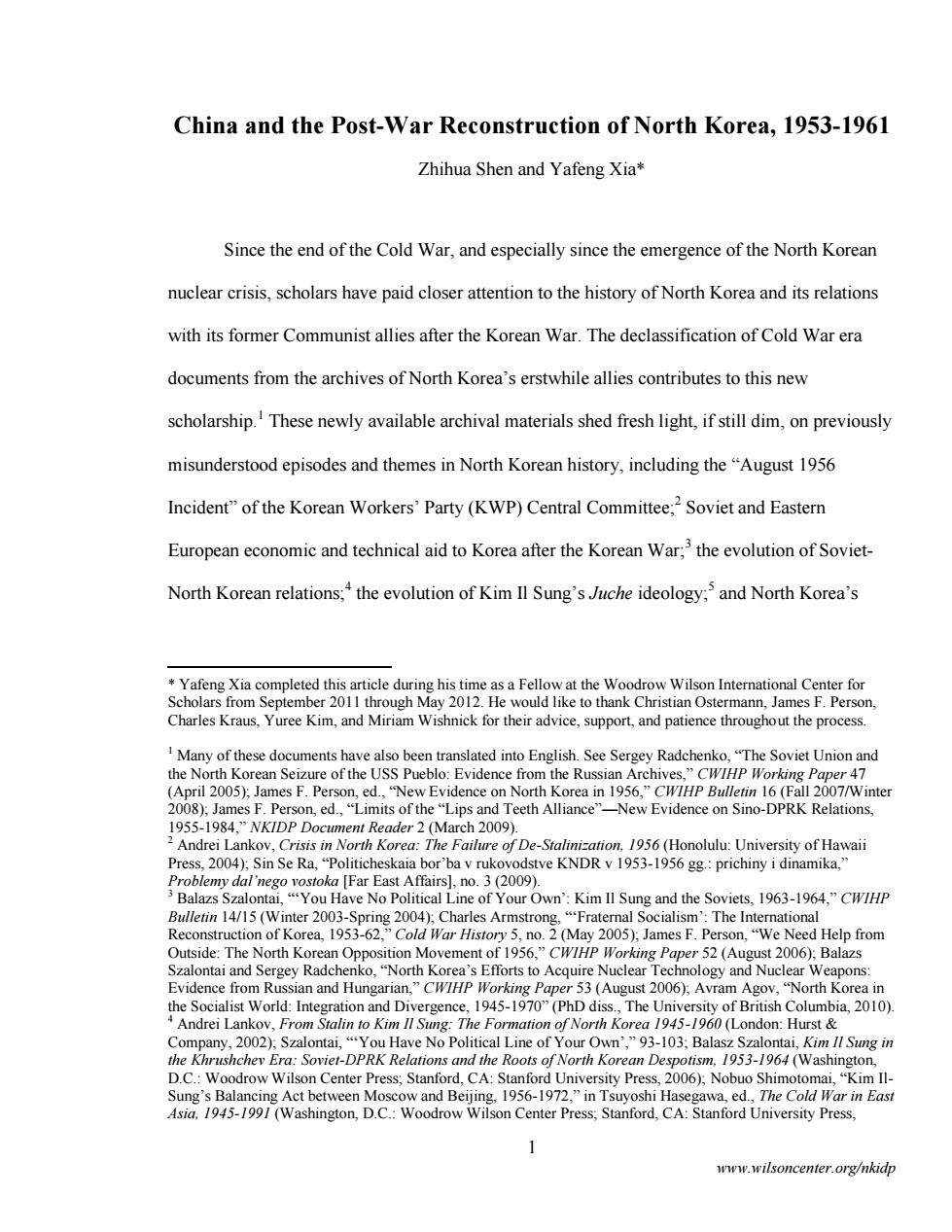正在加载图片...

China and the Post-War Reconstruction of North Korea,1953-1961 Zhihua Shen and Yafeng Xia* Since the end of the Cold War,and especially since the emergence of the North Korean nuclear crisis,scholars have paid closer attention to the history of North Korea and its relations with its former Communist allies after the Korean War.The declassification of Cold War era documents from the archives of North Korea's erstwhile allies contributes to this new scholarship.'These newly available archival materials shed fresh light,if still dim,on previously misunderstood episodes and themes in North Korean history,including the "August 1956 Incident"of the Korean Workers'Party(KWP)Central Committee;Soviet and Eastern European economic and technical aid to Korea after the Korean War;'the evolution of Soviet- North Korean relations,the evolution of Kim Il Sung'sJuche ideology,and North Korea's Yafeng Xia completed this article during his time as a Fellow at the Woodrow Wilson International Center for Scholars from September 2011 through May 2012.He would like to thank Christian Ostermann,James F.Person, Charles Kraus,Yuree Kim,and Miriam Wishnick for their advice,support,and patience throughout the process. 1 Many of these documents have also been translated into English.See Sergey Radchenko,"The Soviet Union and the North Korean Seizure of the USS Pueblo:Evidence from the Russian Archives,"CWIHP Working Paper 47 (April 2005);James F.Person,ed.,"New Evidence on North Korea in 1956,"CWIHP Bulletin 16(Fall 2007/Winter 2008);James F.Person,ed.,"Limits of the"Lips and Teeth Alliance"-New Evidence on Sino-DPRK Relations, 1955-1984,"NKIDP Document Reader 2 (March 2009). Andrei Lankov,Crisis in North Korea:The Failure of De-Stalinization,1956(Honolulu:University of Hawaii Press,2004),Sin Se Ra,"Politicheskaia bor'ba v rukovodstve KNDR v 1953-1956 gg.:prichiny i dinamika," Problemy dal'nego vostoka [Far East Affairs],no.3(2009). 3 Balazs Szalontai,"You Have No Political Line of Your Own':Kim Il Sung and the Soviets,1963-1964,"CWIHP Bulletin 14/15(Winter 2003-Spring 2004);Charles Armstrong,"Fraternal Socialism':The International Reconstruction of Korea,1953-62,"Cold War History 5,no.2(May 2005);James F.Person,"We Need Help from Outside:The North Korean Opposition Movement of 1956,"CWIHP Working Paper 52(August 2006);Balazs Szalontai and Sergey Radchenko,"North Korea's Efforts to Acquire Nuclear Technology and Nuclear Weapons: Evidence from Russian and Hungarian,"CWIHP Working Paper 53(August 2006);Avram Agov,"North Korea in the Socialist World:Integration and Divergence,1945-1970"(PhD diss.,The University of British Columbia,2010). Andrei Lankov,From Stalin to Kim Il Sung:The Formation of North Korea 1945-1960 (London:Hurst Company,2002);Szalontai,"You Have No Political Line of Your Own',"93-103;Balasz Szalontai,Kim II Sung in the Khrushchey Era:Soviet-DPRK Relations and the Roots of North Korean Despotism,1953-1964 (Washington, D.C.:Woodrow Wilson Center Press;Stanford,CA:Stanford University Press,2006);Nobuo Shimotomai,"Kim Il- Sung's Balancing Act between Moscow and Beijing,1956-1972,"in Tsuyoshi Hasegawa,ed.,The Cold War in East Asia,1945-199/(Washington,D.C.:Woodrow Wilson Center Press;Stanford,CA:Stanford University Press, www.wilsoncenter.org/nkidp1 www.wilsoncenter.org/nkidp China and the Post-War Reconstruction of North Korea, 1953-1961 Zhihua Shen and Yafeng Xia* Since the end of the Cold War, and especially since the emergence of the North Korean nuclear crisis, scholars have paid closer attention to the history of North Korea and its relations with its former Communist allies after the Korean War. The declassification of Cold War era documents from the archives of North Korea’s erstwhile allies contributes to this new scholarship.1 These newly available archival materials shed fresh light, if still dim, on previously misunderstood episodes and themes in North Korean history, including the “August 1956 Incident” of the Korean Workers’ Party (KWP) Central Committee; 2 Soviet and Eastern European economic and technical aid to Korea after the Korean War; 3 the evolution of SovietNorth Korean relations; 4 the evolution of Kim Il Sung’s Juche ideology; 5 and North Korea’s * Yafeng Xia completed this article during his time as a Fellow at the Woodrow Wilson International Center for Scholars from September 2011 through May 2012. He would like to thank Christian Ostermann, James F. Person, Charles Kraus, Yuree Kim, and Miriam Wishnick for their advice, support, and patience throughout the process. 1 Many of these documents have also been translated into English. See Sergey Radchenko, “The Soviet Union and the North Korean Seizure of the USS Pueblo: Evidence from the Russian Archives,” CWIHP Working Paper 47 (April 2005); James F. Person, ed., “New Evidence on North Korea in 1956,” CWIHP Bulletin 16 (Fall 2007/Winter 2008); James F. Person, ed., “Limits of the “Lips and Teeth Alliance”—New Evidence on Sino-DPRK Relations, 1955-1984,” NKIDP Document Reader 2 (March 2009). 2 Andrei Lankov, Crisis in North Korea: The Failure of De-Stalinization, 1956 (Honolulu: University of Hawaii Press, 2004); Sin Se Ra, “Politicheskaia bor’ba v rukovodstve KNDR v 1953-1956 gg.: prichiny i dinamika,” Problemy dal’nego vostoka [Far East Affairs], no. 3 (2009). 3 Balazs Szalontai, “‘You Have No Political Line of Your Own’: Kim Il Sung and the Soviets, 1963-1964,” CWIHP Bulletin 14/15 (Winter 2003-Spring 2004); Charles Armstrong, “‘Fraternal Socialism’: The International Reconstruction of Korea, 1953-62,” Cold War History 5, no. 2 (May 2005); James F. Person, “We Need Help from Outside: The North Korean Opposition Movement of 1956,” CWIHP Working Paper 52 (August 2006); Balazs Szalontai and Sergey Radchenko, “North Korea’s Efforts to Acquire Nuclear Technology and Nuclear Weapons: Evidence from Russian and Hungarian,” CWIHP Working Paper 53 (August 2006); Avram Agov, “North Korea in the Socialist World: Integration and Divergence, 1945-1970” (PhD diss., The University of British Columbia, 2010). 4 Andrei Lankov, From Stalin to Kim Il Sung: The Formation of North Korea 1945-1960 (London: Hurst & Company, 2002); Szalontai, “‘You Have No Political Line of Your Own’,” 93-103; Balasz Szalontai, Kim Il Sung in the Khrushchev Era: Soviet-DPRK Relations and the Roots of North Korean Despotism, 1953-1964 (Washington, D.C.: Woodrow Wilson Center Press; Stanford, CA: Stanford University Press, 2006); Nobuo Shimotomai, “Kim IlSung’s Balancing Act between Moscow and Beijing, 1956-1972,” in Tsuyoshi Hasegawa, ed., The Cold War in East Asia, 1945-1991 (Washington, D.C.: Woodrow Wilson Center Press; Stanford, CA: Stanford University Press